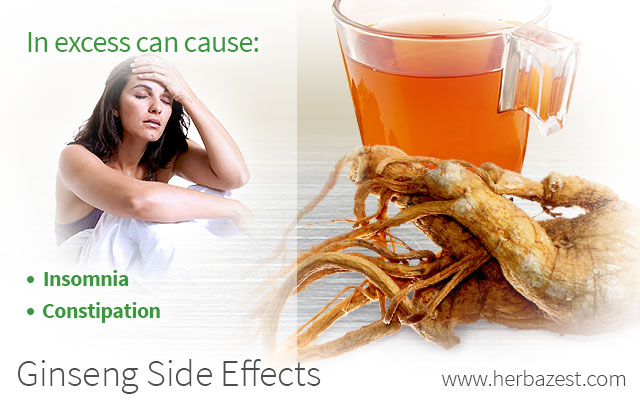Ginseng is considered to be a very safe herbal medicine with few side effects, most of which are minor and reversible. However, high doses of ginseng, long-term use, or the combination with other drugs can lead to some adverse effects.
Most Reported Side Effects of Ginseng
The following adverse effects have been observed in clinical settings.
Ginseng Abuse Syndrome
While medicinal consumption of dried ginseng root is relatively safe, if taken in high doses over a long period of time, a person can develop ginseng abuse syndrome, or ginseng dependency. Common symptoms of ginseng dependency are nervousness, sleeplessness, skin rash, hypertension, diarrhea, confusion, and depression.
A study published by the Journal of the American Medical Association (1980) examined long-term ginseng users and found that 10% experienced hypertension with nervousness, sleeplessness, skin eruptions, and morning diarrhea. The study found that the 20 men, from ages 21 - 35, who developed hypertension after 13 weeks of ginseng use all had increased systolic and diastolic blood pressure.
In order to avoid ginseng side effects for long-term consumption, a break of two weeks for every two weeks of usage is recommended.
Insomnia
Ginseng's ability to increase alertness is one of the reasons it is such a popular ingredient in energy drinks. However, a high dose of ginseng to boost other health factors often results in the side effect of insomnia.
A review published on the Journal of the American Academy of Nurse Practitioners (2012) examined literature on the adverse effects of energy drinks with a focus on caffeine, taurine, ginseng, and sugar, and confirmed that ginseng can potentiate the sleeplessness effect of caffeine, including other symptoms such as nervousness, gastrointestinal upset, tremors, and anxiety. The review made note that the side effects are especially severe in young children.
Ginseng Side Effects in Men
Additionally, a systematic review published in the British Journal of Clinical Pharmacology (2008) reported that a few Korean red ginseng side effects, while mild and uncommon, were reported in five of the seven reviewed clinical studies focused on the treatment of erectile dysfunction. The adverse reactions included insomnia, gastric upset, and constipation.
Unconfirmed Side Effects of Ginseng
While there are few scientific studies indicating the effects of ginseng during the prenatal period, many people warn against its use during pregnancy and breastfeeding.
According to a review published in the Journal of Clinical Pharmacology (2008), the compiled data show no evidence of Panax ginseng side effects when the herb is consumed during pregnancy, and concluded that the warnings may be a result of animal embryo studies, where ginsenoside exposure led to congenital malformations. The study argues that the conclusions of these in vitro tests should not be extrapolated to humans, as they are a result of exposure to a much higher level of ginsenosides than the one attainable through normal human consumption.
IT'S IMPORTANT TO HAVE IN MIND THAT ALL HERBS AFFECT THE BODY IN ONE WAY OR ANOTHER AND THE SENSITIVITY TO THEIR MEDICINAL ACTIONS MAY GREATLY VARY FROM PERSON TO PERSON.
Ginseng Cautions and Interactions
Although science has shown that ginseng has medicinal benefits and is very safe when used in appropriate doses, as with any other herb, it may cause undesirable effects under certain health conditions and interact with other herbs, supplements, or medications.
Ginseng Cautions
Autoimmune disease. People with rheumatoid arthritis, lupus, Crohn's disease, or any other autoimmune disease should consult a health professional before using ginseng, as it may overstimulate the immune system. Individuals with transplanted organs should not take ginseng.
Pre-surgery. Anyone who is scheduled to have surgery should stop using ginseng at least seven days prior, as ginseng could increase the risk of bleeding during or after the surgery.
Pregnancy and breastfeeding. Although consuming ginseng is safe during pregnancy, caution should be taken during the first trimester and during lactation.
Mental illnesess. Individuals diagnosed with schizophrenia, should not take ginseng.
PEOPLE WITH PREEXISTING CONDITIONS - E.G., CHRONIC ILLNESSES AND GENETIC CONDITIONS - AS WELL AS THOSE WHO ARE PREGNANT OR BREASTFEEDING SHOULD FOLLOW GENERAL PRECAUTIONS BEFORE TAKING ANY HERBAL SUPPLEMENT, IN ACCORDANCE WITH MEDICAL ADVICE.
Ginseng Interactions
Ginseng is a powerful medicinal herb, and therefore, when mixed with other medications, it can lead to adverse effects.
Consult with a health professional before taking ginseng if you are currently taking any of the following:
- Blood pressure medications
- Calcium channel blockers
- Blood thinners
- Caffeine
- Diabetes medications (including insulin)
- Drugs suppressing the immune system
- Stimulants
- Morphine
Ginseng's several benefits make it a very popular herb, widely used to increase vitality and alleviate a variety of health conditions. However, studies show that ginseng side effects are possible, and it is important to consider preexisting conditions as well as the above mentioned cautions before starting to consume any form of ginseng.
Sources
- British Journal of Clinical Pharmacology, Red ginseng for treating erectile dysfunction: a systematic review, 2008
- Journal of the American Academy of Nurse Practitioners, Energy drinks: What is all the hype? The dangers of energy drink consumption, 2012
- Public Health Nutrition, Efficacy and safety of ginseng, 2000
- The Canadian Journal of Clinical Pharmacology, Safety and efficacy of panax ginseng during pregnancy and lactation, 2008
- The Journal of the American Medical Association, Ginseng and High Blood Pressure, 1980
- University of Maryland Medical Center, Asian ginseng | American ginseng




